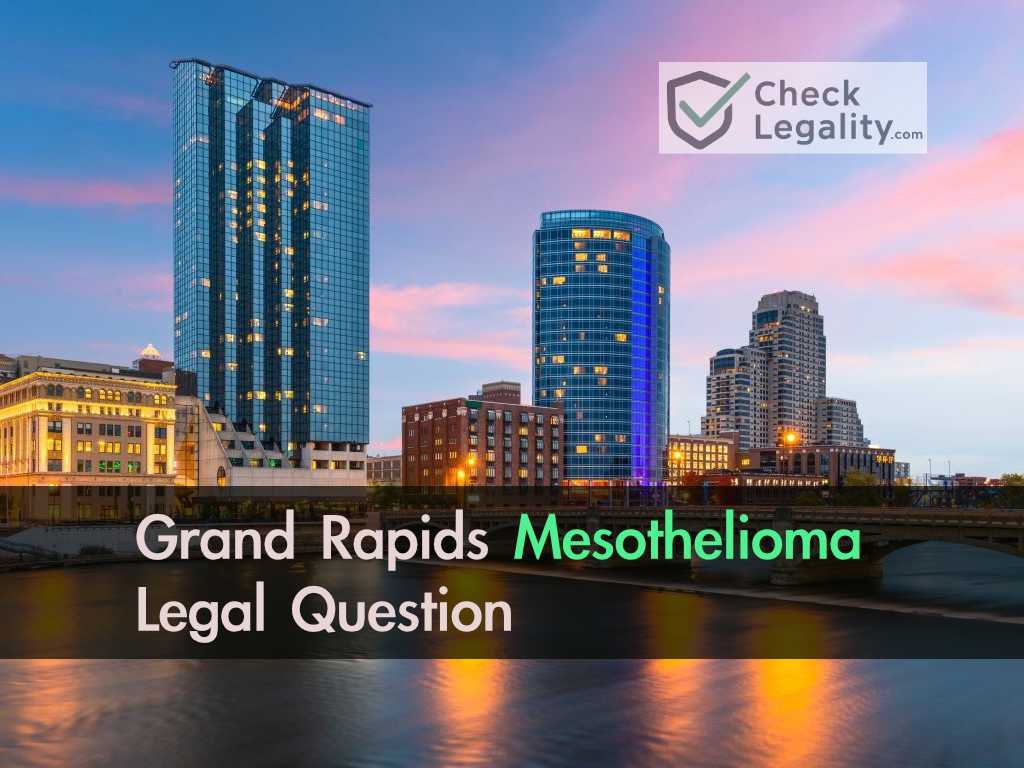Grand Rapids Mesothelioma Legal Question is now increasingly worrying than ever for its long-term residents. Mesothelioma, a severe and often fatal condition caused by asbestos exposure, poses a significant legal and health challenge in Grand Rapids, Michigan. This malignant disease primarily affects the lining of the lungs and is directly linked to the inhalation of asbestos fibers, which were commonly used in construction materials up until the late 20th century. The “Grand Rapids mesothelioma legal question” centers around navigating the complexities of mesothelioma claims, which involve understanding local legal frameworks, identifying potential compensation avenues, and taking appropriate steps following a diagnosis. This article provides vital insights and guidance for Grand Rapids residents grappling with this distressing diagnosis, aiming to clarify their legal rights and the avenues available for seeking justice and compensation.
Key Takeaways
- Complex Legal Landscape: Mesothelioma cases in Grand Rapids are influenced by intricate legal and medical factors that require specialized understanding and strategic navigation.
- Local Legal Variations: The approach to mesothelioma litigation can vary significantly across different jurisdictions. Grand Rapids residents must navigate Michigan-specific asbestos regulations that impact their cases.
- Importance of Prompt Action: Securing a diagnosis and beginning the legal process quickly are crucial. Early action facilitates better outcomes by preserving evidence and meeting critical legal deadlines.
- Comprehensive Legal Support Available: Residents of Grand Rapids, including those in East Grand Rapids, have access to legal professionals who specialize in mesothelioma cases. These experts can provide essential support from the initial case evaluation to the resolution of the claim.
- Potential for Substantial Compensation: Individuals affected by mesothelioma in Grand Rapids can pursue compensation for medical expenses, lost wages, and non-economic damages like pain and suffering, which are crucial for alleviating the financial burden of the disease.
Mesothelioma Exposure in Grand Rapids
Mesothelioma, a devastating disease primarily caused by asbestos exposure, has significant historical and ongoing implications for residents of Grand Rapids, Michigan. Understanding where and how exposure occurs can help potential victims assess their risk and take necessary precautions.
Historical Context
Grand Rapids’ industrial and architectural history is marked by extensive use of asbestos, particularly in the mid-20th century when the city experienced rapid industrial growth. Key industries such as automotive manufacturing, furniture production, and construction widely utilized asbestos for its heat-resistant properties and strength, unknowingly endangering workers and the general public.
Affected Locations
Asbestos exposure in Grand Rapids is not confined to industrial settings; it also extends to public and private buildings:
- Industrial Sites: Many factories and manufacturing plants in Grand Rapids used asbestos extensively, especially those involved in metalworking and automotive components production.
- Public Buildings: Schools, government buildings, and hospitals built during the peak period of asbestos use contain this hazardous material, especially in insulation, ceiling tiles, and fireproof barriers.
- Residential Buildings: Older residential areas, particularly those constructed before the 1980s, are likely to contain asbestos materials in roofing, plumbing, and flooring.
Recent Developments
Despite regulations reducing the use of asbestos in recent decades, exposure risks persist, particularly during demolition and renovation of old buildings. Projects in historically industrial areas of Grand Rapids often uncover previously undisturbed asbestos, posing new risks to workers and nearby residents.
Health Impact
Exposure to asbestos in Grand Rapids has led to higher incidences of mesothelioma and other asbestos-related diseases. These health issues often manifest decades after the initial exposure, complicating diagnosis and treatment.
Mapping Exposure Risk
Efforts to map asbestos exposure have highlighted several “hot spots” in Grand Rapids, particularly in East Grand Rapids and older downtown areas. Public health initiatives aim to monitor these areas closely, providing residents and workers with information necessary to minimize exposure.
Legal Framework for Mesothelioma in Grand Rapids
The legal handling of mesothelioma cases in Grand Rapids is shaped by both federal and state laws that aim to protect public health and ensure justice for affected individuals. Familiarity with these laws is essential for anyone pursuing a mesothelioma claim.
Federal Asbestos Regulations
At the federal level, several laws and regulations address the use and abatement of asbestos, setting the groundwork for legal action in cases of mesothelioma:
- Clean Air Act (CAA): Regulates air pollutants nationwide, including asbestos. It mandates the implementation of control measures to limit asbestos emissions during demolition, renovation, and disposal of asbestos-containing materials.
- Toxic Substances Control Act (TSCA): Empowers the Environmental Protection Agency (EPA) to require reporting, record-keeping and testing regarding chemical substances, including asbestos. The TSCA also provides guidelines for the safe disposal of asbestos materials.
- Asbestos Hazard Emergency Response Act (AHERA): Requires public schools to inspect for asbestos and prepare management plans to reduce the risk of exposure among schoolchildren and faculty.
Michigan State Asbestos Laws
In addition to federal regulations, Michigan has established specific laws that address the handling and removal of asbestos to prevent exposure:
- Michigan Occupational Safety and Health Administration (MIOSHA): is the enforment body behind safety and health legislation in workplaces, including regulations specific to asbestos in the construction industry. MIOSHA’s standards are designed to ensure that asbestos removal practices are safely conducted to protect workers and the public from asbestos exposure during renovations and demolitions.
- Public Act 135 of 1986 (Asbestos Abatement Contractors Licensing Act): Requires all asbestos abatement contractors to be licensed and follow strict procedures for asbestos removal, encapsulation, and encapsulation. This act helps ensure that all personnel involved are adequately trained and adhere to safety protocols.
Local Regulations in Grand Rapids
Grand Rapids may also have local ordinances that complement state and federal laws, particularly concerning building inspections and the issuance of permits for construction and demolition:
- Building Codes and Permits: Local building codes typically incorporate state and federal asbestos regulations to ensure that any construction or demolition work involving asbestos-containing materials is conducted safely and in compliance with legal standards.
- Health Department Initiatives: The Grand Rapids Health Department may run programs aimed at educating the public about asbestos risks and safe practices for handling asbestos-containing materials, especially in residential settings.
Legal Recourse for Mesothelioma Victims
Understanding these laws is crucial for mesothelioma victims considering legal action. The statutes provide the basis for:
- Claims for Compensation: Victims can file claims against employers, building owners, and asbestos product manufacturers if they can prove negligence or failure to warn about asbestos dangers.
- Litigation and Settlements: Mesothelioma litigation may result in settlements or jury verdicts that compensate victims for pain and suffering endured due to asbestos or mesothelioma-related illnesses, lost wages, medical expenses, and any other damages related to their exposure.
Grand Rapids Mesothelioma Legal Questions Answered
Navigating the legal aspects involving a mesothelioma diagnosis can be daunting. Here, we address some of the most frequent questions posed by Grand Rapids residents to help clarify the steps involved in pursuing justice and compensation.
What Are the First Legal Steps to Take After a Mesothelioma Diagnosis?
- Consult with a Specialist Lawyer: Immediately after a diagnosis, contact a lawyer who specializes in mesothelioma and asbestos-related cases. Legal expertise is crucial as these cases can be highly complex and require experienced handling.
- Document Your Medical Diagnosis and History: Compile all medical documentation related to your mesothelioma diagnosis, including tests, treatments, and any related medical expenses. This information will be vital in proving the link between your exposure to asbestos and your medical condition.
- Identify Potential Asbestos Exposure Sources: With your lawyer, work to identifying any potential sources of asbestos exposure, which could include previous workplaces, homes, schools, or public buildings.
How Do I Prove Liability in a Mesothelioma Case?
Proving liability involves demonstrating that the defendant (such as an employer, product manufacturer, or building owner) knew or should have known about the dangers of asbestos and failed to protect against those risks effectively. Key aspects include:
- Exposure Documentation: Showing where, when, and how you were exposed to asbestos through employment records, witness statements, and expert testimonies.
- Negligence Proof: Establishing that the defendant had a duty to prevent exposure and breached that duty, leading to your condition.
- Expert Witnesses: Often, medical and industry experts will testify regarding the asbestos use in your specific context and the foreseeable risks it posed.
What Types of Compensation Can Mesothelioma Victims Seek?
Victims of mesothelioma in Grand Rapids can pursue several types of compensation. The compensation depends on the specifics of their case:
- Medical Expenses: This type of compensation covers past, present, and future medical treatment related to mesothelioma.
- Lost Wages: This Compensation is applied for lost earnings due to illness.
- Pain and Suffering: Monetary compensation for physical pain and emotional distress.
- Punitive Damages: In cases of serious negligence, punitive damage compensations may be awarded to punish and deter similar conduct in the future by the wrongdoer.
- Wrongful Death Claims: If mesothelioma leads to death, family members of the deceased may be eligible to file a lawsuit for wrongful death on his/her behalf.
What is the Current Statute of Limitations for Filing a Mesothelioma Claim in Michigan?

In Michigan, similar to Compton and Columbus the statute of limitations for filing a personal injury claim, particularly mesothelioma claims, is generally three years from the date the disease is diagnosed. However, because mesothelioma and other serious asbestos-related illnesses can take decades to develop, Michigan law starts the clock at the time of diagnosis rather than the time of exposure. It is paramount to consult with a legal expert in your area to ensure timely filing and avoid forfeiting your right to compensation.
Legal Rights and Mesothelioma in Grand Rapids
Mesothelioma patients in Grand Rapids have several legal rights that provide pathways to seek compensation and hold accountable those responsible for asbestos exposure. Here’s a detailed look at these rights and how they can be applied:
Right to Compensation
Individuals diagonised with mesothelioma due to asbestos exposure have the right to seek compensation for a variety of damages. This compensation is not limited to medical bills but extends to cover:
- Medical Expenses: Costs incurred from the treatment of mesothelioma, including future medical expenses that are likely to arise.
- Lost Wages: Compensation for lost earnings during periods of illness and treatment.
- Pain and Suffering: This covers the physical pain and emotional distress caused by the illness.
- Loss of Quality of Life: Because mesothelioma severely impacts life expectancy and the ability to lead a normal, active life, compensation can be sought for this loss.
- Punitive Damages: In cases where the exposure was due to gross negligence, punitive damages may be pursued to punish the offending party and deter future negligence.
Right to a Safe Environment
- Workplace Safety: This states that employees have the right to work in environments that are free from harmful asbestos exposure. Employers must follow strict regulations regarding asbestos use and abatement, and failure to do so opens them up to legal liability.
- Residential and Public Safety: Tenants and visitors to public buildings have the right to be informed about the presence of asbestos and to live and visit places that are free from asbestos-related hazards.
Legal Recourse for Asbestos Exposure
Mesothelioma patients have multiple avenues to pursue legal recourse:
- Personal Injury Lawsuits: Patients can file lawsuits against employers, product manufacturers, or property owners who failed to properly manage or disclose asbestos hazards.
- Workers’ Compensation: If exposure occurred in the workplace, mesothelioma patients might be eligible for workers’ compensation benefits, which can provide medical benefits and compensation for disability.
- Asbestos Trust Funds: For companies that have gone bankrupt, asbestos trust funds have been established to provide compensation to any individuals exposed to asbestos by those companies.
- Class Action Lawsuits: If a large number of people have been similarly affected by asbestos exposure, they may have the option to file a class action lawsuit against the responsible party.
Statute of Limitations
Understanding the statute of limitations is crucial:
- Personal Injury Claims: In Michigan, the statute of limitations for filing a personal injury claim for mesothelioma is three years from the official date of diagnosis.
- Wrongful Death Claims: For wrongful death claims arising from mesothelioma, the statute of limitations is also three years from the date of death of the patient.
Mesothelioma Litigation Process in Grand Rapids
The litigation process for mesothelioma cases can be intricate and emotionally taxing, but understanding each phase can help victims and their families prepare adequately. Here’s what you need to know:
Filing a Claim
The initial step in the mesothelioma litigation process is to formally file a claim. This involves several critical tasks:
- Legal Representation: Engage a mesothelioma attorney who understands the complexities of asbestos litigation and has a proven track record in similar cases.
- Case Evaluation: Your case will be evaluated by your attorney based on your medical records, employment history, and exposure timeline to establish the foundation of your claim.
- Filing the Lawsuit: A detailed legal complaint is drafted and filed in the appropriate court. This document outlines your case against the defendants, specifying the negligence that led to your asbestos exposure.
Discovery Phase
Once the lawsuit is filed, the case now moves into the next phase called the discovery phase, where both sides gather evidence:
- Document Exchange: Both parties exchange relevant documents, such as medical records, employment records, and any other evidence that supports the claim of asbestos exposure and related illness.
- Depositions: Key witnesses, including the plaintiff, family members, former coworkers, and experts, may be interviewed under oath by attorneys representing all parties.
- Expert Testimonies: Specialist witnesses in medical fields and industry experts are often brought in to provide testimony that supports the plaintiff’s claims about asbestos exposure and its health impacts.
Settlement Negotiations
Most mesothelioma cases are settled out of court during or after the discovery phase:
- Mediation and Negotiation: Both parties may agree to mediation where a neutral third party helps negotiate a settlement. If negotiations are successful, the terms are finalized, and the case does not go to trial.
- Settlement Benefits: Settlements are generally faster, less expensive, and less stressful than going to trial, providing compensation to the victim in a timelier manner.
Trial
If a settlement cannot be reached, the case will proceed to trial:
- Pre-Trial Preparations: Both sides prepare presentations and arguments for the court, organizing all evidence and witness testimonies.
- Jury Selection: A jury is selected through a process called voir dire, where potential jurors are questioned to ensure they can judge the case fairly.
- Court Proceedings: The trial itself includes opening statements, witness testimonies, cross-examinations, and closing arguments.
- Verdict: The jury deliberates and then delivers a verdict. If they find in favor of the plaintiff, they will also determine the amount of compensation.
Appeals Process
Either party can appeal the court’s decision if they believe legal errors were made that could have affected the verdict:
- Filing an Appeal: Appeals must be filed within a specific timeframe post-verdict, usually 30 days.
- Appeal Considerations: An appellate court reviews the proceedings of the trial to ensure the law was applied correctly. They can uphold, reverse, or remand the decision back to the lower court for further actions.
Resources for Mesothelioma Victims in Grand Rapids
Local Law Firms Specializing in Mesothelioma
Legal support is crucial for mesothelioma victims seeking compensation. The following law firms in Grand Rapids have expertise in handling asbestos-related cases:
- Grand Rapids Asbestos Law Group: Known for their depth of experience with asbestos cases, they provide comprehensive legal representation and can help navigate the complex landscape of mesothelioma litigation.
- Michigan Mesothelioma Legal Center: This firm offers specialized legal services focused on asbestos exposure, ensuring that clients receive knowledgeable and empathetic legal counsel.
Medical Facilities Specializing in Mesothelioma Treatment
Effective medical treatment is a cornerstone of managing mesothelioma. Key healthcare providers in Grand Rapids include:
- Spectrum Health Cancer Center: Offers advanced oncology services, including mesothelioma treatment options like surgery, chemotherapy, and radiation therapy, along with clinical trials for new treatments.
- Mercy Health Saint Mary’s: Their oncology department provides specialized care for mesothelioma patients, focusing on holistic treatment plans that address both physical and emotional health needs.
Support Groups for Patients and Families
Support groups provide emotional and practical support to mesothelioma patients and their families. Grand Rapids hosts several such groups:
- Mesothelioma Foundation Support Group: Meets monthly to offer support, education, and advocacy for patients and families affected by mesothelioma.
- Online Mesothelioma Patient Portal: An online resource providing access to forums and patient advocacy groups, which can be particularly helpful for those unable to attend in-person meetings.
Educational Resources
Educating yourself about mesothelioma can help you make informed decisions about treatment and legal action:
- American Cancer Society (ACS) – Grand Rapids Office: Provides pamphlets, books, and other materials on mesothelioma. They also offer workshops and seminars on understanding cancer and navigating cancer treatment.
- National Mesothelioma Foundation: Offers a wealth of online resources, including treatment options, research news, and patient advocacy information.
Advocacy and Research Organizations
Getting involved with advocacy and research can provide hope and support for systemic changes benefiting mesothelioma patients:
- Mesothelioma Applied Research Foundation: Funds research into mesothelioma and advocates for federal funding to support more extensive research projects.
- Asbestos Disease Awareness Organization (ADAO): Focuses on preventing asbestos exposure to reduce mesothelioma incidence. This organization also advocates for policy changes and better asbestos regulation.


